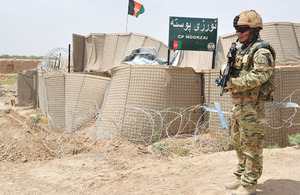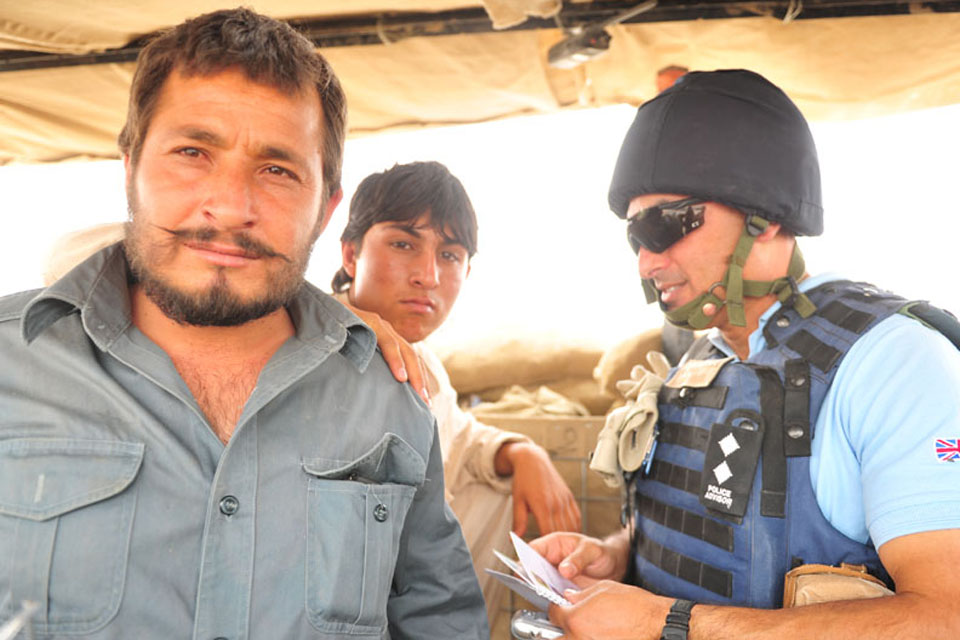MOD personnel move Afghan Police development forward
Various MOD personnel from soldiers to the Ministry of Defence Police are helping move the Afghan Police from soldiering over to community policing.

A Gurkha protects the gate at Checkpoint Noorzai during a visit [Picture: Crown Copyright/MOD 2011]
Wilting in the unfamiliar heat and buckling under the weight of the body armour, I watch dismayed as the Gurkha encourages me to follow him. With great agility he scurries up the combat ladder and onto the roof of the compound. My ascent is more measured.
The delightful and charming Sergeant is keen to show me the machine gun posts and where he and his men sleep, having pulled the ladder up after them, just in case.
We are looking round a checkpoint a kilometre or so down the road from Patrol Base (PB) Chilli. It is manned by the newly-created Afghan Local Police (ALP); the Gurkhas are training them and live alongside them.
The scheme, which is still in its infancy, was the brainchild of General Petraeus. It was introduced in order to bring outlying rural areas some semblance of self-defence. The deal is that where a village can provide enough men, the Government will pay for a week’s training and supply them with small arms weapons to keep the peace.
It is hoped that in time, in addition to providing security to more remote areas, if successful, this local police force will prove to be a recruiting sergeant for the more established Afghan National Police.
Opinions vary about the level of risk attached to the plan. Lieutenant Commander Shar Mohammad of the elite Afghan National Civil Order Police (ANCOP), who commands personnel from a compound adjacent to PB Chilli, is in no doubt that it is a mistake.
He is sure that it is putting weapons into the hands of the insurgents and will only serve to make his job more difficult. However, Lieutenant Colonel Oliver Lee, Commanding Officer of Forward Operating Base (FOB) Shawqat’s Battle Group, 45 Commando, belongs to that group that believes it is a worthwhile and manageable risk:
In Nad ‘Ali a straw poll shows that the ALP are very popular, and, better than that, we know that the Taliban hate it. They see it as the people turning against them and restricting their freedom of movement in their own backyard,” he said.

Ministry of Defence Police Inspector Tony Micallef looks in on Afghan Police at Checkpoint Noorzai [Picture: Crown Copyright/MOD 2011]
The next day starts with a short walk out of FOB Shawqat to visit the ANCOP HQ, from where the District Chief of Police (DCOP) commands his police force.
This is the heart of the policing operation, providing order and authority to those communities closer to the district centre, and represents the next step up in terms of trained and professional policing.
From here the DCOP commands around 350 Afghan Uniformed Police and 170 ANCOP personnel ranging across 13 established police precincts. He refers to them as his soldiers.
Billeted with and partnering the police is the International Security Assistance Force’s Police Mentoring and Advisory Group, which at the moment is 2nd Battalion The Royal Gurkha Rifles.
A big development recently introduced and whipped into shape by Colour Sergeant Raj is the operations room, from where the DCOP’s orders are planned and put into action. The co-ordination of operations and intelligence are dealt with through this communications hub:
At first there was no understanding of what an operations room should be, but now they can see the benefits,’ said Colour Sergeant Raj.
Also on hand to advise and guide is MOD policeman Inspector Tony Micallef. Despite 20 years’ policing experience, Inspector Micallef, who’s normal patch is Devonport, has a tough job on his hands. Today I am going out with him to look at some of the police checkpoints around Nad ‘Ali. As we set off in the Ridgbacks he tells me about what is on his plate:
The DCOP is a very capable man, and has strong views about his authority. I have to find ways to get my ideas across without seeming to challenge him or suggest he isn’t doing things properly. His favourite tactic is to change the subject. I might make a suggestion and he will start to complain about a lack of petrol.
Then days later I may well see he has made the change. So I’ll give it a week and then say to him ‘I see you have made such and such a change, I’m impressed, good idea’. Then we both smile. Face has been saved.
One of the challenges the Inspector faces is in helping to move the police away from the soldiering role that the situation has so far demanded, and into a core policing role:
The DCOP is very astute in many things, and has some good ideas about how to get the public engaged with the police, but he sees himself as an army chief and gets involved in operations when he should be back at HQ conducting things from the centre.
But Inspector Micallef knows he has to be patient and pragmatic about bringing in change:
I have to consider what is right for here. Some things I see may completely contravene what I consider to be best practice, but which could be perfectly acceptable here.
For example, in Afghanistan the collection and processing of evidence is not what you would expect to see in a police station in the UK. The treatment of witnesses is different too - they can find themselves held in the cells with suspects. This is just one of the areas where the Inspector hopes to make a difference, but it won’t be easy:
In fact the DCOP sometimes disciplines his own men by putting them in the cells over night. But they seem to accept it as fair,” he said, “and maybe here it is acceptable.
Two days later I get an example of the conundrum facing the Inspector. He stops me in the line for breakfast. He is excited by a police success.
Based on intelligence received, the DCOP organised a raid which led to the capture and arrest of 25 Taliban. It is great news, but it also illustrates the challenges of balancing the notion of best practice against the concept of ‘Afghan good enough’.
The captured men were robustly interrogated:
One was quite badly injured, I think he had fallen off his motorbike, he hadn’t been treated so I gave him first aid,” said Inspector Micallef.
They looked totally crushed and dejected. Then when they were being photographed, holding their weapons as evidence, I noticed one still had a magazine in it, but it wasn’t considered dangerous.
Also, if we had to process that many people in Devonport, I’d have to call in help, but the DCOP was quite happy to do it all himself.
Our Ridgback jolts to a halt. We have arrived at the first police compound at Noorzai. Climbing down from the vehicle, I realise I’ve been here before, about five months ago in fact. The reason for that trip was to look at the potential for placing a checkpoint here, to control a crossroads.
Now, it is here, and further development work is planned over the next few weeks.
Inspector Micallef goes to talk to the policemen manning the checkpoint. He is impressed:
They seem really happy, that’s the first time I haven’t had complaints about fuel. The whole set up looks good,” he said.
He chats for a while, and explains about promotion, something that tends to raise doubts as they worry that it could mean being moved out of the area.
The Inspector checks that the right number of police are here. Sometimes there are problems with individuals turning up at more than one checkpoint, but it all seems fine, so on we go to Zaborabad.
Here at first sight things look unimpressive. Although the courgette and aubergine rows around the central building are well tended (the police usually grow their own food), most of the police are asleep.
But it turns out that there is a good reason for that. Based on intelligence given to them by the locals it seems that they have been out all night hunting down Taliban, and are now catching up on their sleep.
Inspector Micallef is actually heartened by this:
It shows that they are taking their policing out into the community. You have to admire their courage.
Some of the police show us old bullet wounds that they have sustained, whether in the course of their duties it’s impossible to say, but they are adamant that they will do whatever is necessary to protect their communities and chase out the Taliban, even though many have had their families threatened.
Later, back at ANCOP HQ I ask for a military take on the situation. A British captain poo-poos the notion that Zaborabad is a security threat. He considers the police action as unnecessary:
What they mean is that they have been out in the Dash [the ungoverned badlands outside the district] and that is outside their remit.
So, one event, three different views. The police consider their action to be a valid way of combating a security threat, the MDP inspector considers it an example of policing in the community, and the military mind sees the area as low threat. All are probably correct.
But it is a reminder of how difficult it is to really understand the situation here. Nothing is necessarily what it at first appears to be, and reaching an assessment of what is good or bad really depends on your perspective.